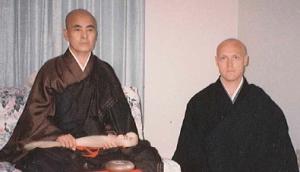
I’ve been working on a review of Brad Warner’s new book, It Came From Beyond Zen: More Practical Advice from Dōgen, Japan’s Greatest Zen Master, to be posted soon. Given that I have a different perspective than Warner and nonkōan Zen folks generally on what Dōgen practiced and taught, and given the curious sensitivity of the kōan issue, I thought I might do some preemptive blogging.
After I write about my views on Dōgen and kōan, you see, although there are numerous Zennists with similar views (including such luminaries as Rōshis Harada Daiun, Yasutani Hakuun, Robert Aitken, Daidō Loori Rōshi, etc.), I often get some nasty blow-back in social media. I think some readers think that I’m betraying the pure Sōtō way.
Indeed, I’m likely to get slammed for venturing into this (again), mostly by folks who don’t seem to wait to read what I have to say (let alone breath and smile) before they hate, including a few who have Sōtō Zen dharma transmission. Most of their arguments amount to either, “You’re dumb,” or the equally convincing, “I believe that Dōgen taught zazen as a kōan-free zone, therefore he did (click here), so please shut up, already. And … you’re dumb.”
It seems to me, though, that we are into the same thing, or at least closer than like 99.99% of the population, so I find it odd to be personally attacked just because my views might slightly differ from theirs, especially in this Trumpworld. And I’m a middle child, so although I’d rather speak up with what I see as the truth than shut up, I really would like us to all get along!
Simply put, I’m not a Dōgen hater. Nor am I ignorant, as one of them once said, at least in my opinion. Katagiri Rōshi worked hard on me to make me informed about Dōgen’s teaching (more on that below). Maybe I’m dumb, though. I am after all entering the fray again, but I’ll let you be the judge of that.
Dumb or not, it occurred to me that in order to reassure potentially hostile readers, I might share a bit about my own personal background with Dōgen, not to say that my credentials are bigger than yours. Just to let you know my background.
Briefly, I’ve not arrived casually at my present (evolving) view of Dōgen’s teaching but through the House of Hard Knocks. The first knock came when I discovered as a naive youngster that the story told about Dōgen by modern Sōtō Zen is an organizational history, told with organizational ends in mind. I had thought that Zen would be different in that way, but in most ways I thought Zen would be different, I’ve found it to be a lot the same as other human endeavors.
Regarding the kōan issue, the present narrative didn’t get firmly established until the 19th Century when the Meiji government insisted that Sōtō and Rinzai differentiate clearly. Or die. But I want to get more personal here.
It all began for me in 1977
on a cold and windy October night in Minneapolis when I met Katagiri Rōshi. Turned out that he was one of the twentieth century’s foremost experts on Dōgen Zen, in my opinion. Katagiri Rōshi had studied with all the big three teachers of mid-twentieth century nonkōan Sōtō Zen, important leaders of back-to-Dōgen movement. Katagiri Rōshi was particularly close to Hashimoto Eko Rōshi, serving as his anja (personal attendant) for three years at Eiheiji. When Katagiri Rōshi went to college at Komazawa University, he studied zazen with Sawaki Kōdō Rōshi, whose lineage has branched into the Uchiyama and Deshimaru lines. Later, along with Shunryu Suzuki Rōshi before he became the founder of the San Francisco Zen megaplex, Katagiri Rōshi attended numerous teaching retreats led by Kishizawa Ian Rōshi.
So the old boy got himself really well educated in Dōgen Zen. And he was smart. Probably the smartest, most well-educated person, buddhalogically speaking, I’ve had the pleasure to meet. In fact, I never won a dharma debate with Katagiri Rōshi, despite giving it my best wholehearted (i.e., dogged, stubborn, and dumb) try on numerous occasions.
Katagiri Rōshi’s life for the thirteen years I was close to him was almost all about zazen, study (at least 85% Dōgen), and teaching. He occasionally took time off for his family and TV, and was especially fond of “Gilligan’s Island” reruns. And the “Cosby Show.” Katagiri Rōshi (despite the seriousness of the above “Face-to-Face Meeting” photo from October 6, 1989) had an intensely silly side.
Nevertheless, he invited all of us (usually no more than fifteen-twenty students) into his deep practice. And intensively practice we did – zazen a couple hours every weekday morning, an hour-and-a-half in the evening, dharma talks at least a couple times a week, forty-some days of sesshin a year, a couple three-month nonresidential practice periods (with student talks at 4:30am), and a couple shorter residential practice periods at Hōkyōji.
Today as I look around the Zen world, what we did in the 70’s and 80’s with Katagiri Rōshi seems to be more intense than what’s offered now in most Zen places. And not all that balanced. Relationships with people outside our Zen bubble certainly suffered, as my first wife could attest. Career opportunities were often passed by in order to focus on Zen practice. We did not save for retirement. Our psychological and physical health were also not priorities. Yet, given the vissiditutes of this fleeting life, I consider myself a very lucky boy to have had that start to my practice.
But back to Dōgen
During my thirteen years with Katagiri Rōshi, I estimate that I attended ~2,000 dharma talks, at least 85% on Dōgen’s teaching. The first and second generation of translations were just coming out in the those days, especially the Tanahashi and Hee Jin Kim versions, and we worked through many fascicles line-by-line. Katagiri Rōshi often substituted alternate translations when he thought it was necessary.
The young Dōshō also seized the opportunities to meet with Katagiri Rōshi in dokusan and had longer practice meetings a few times month, mostly focussed on discussing and sometimes debating Dōgen dharma points (we talked very little about our personal lives).
Once, for example, I read an open letter to Dōgen during a practice period student talk (yes, at 4:30am), criticizing him for not being sufficiently non authoritarian and attached to ritual. I think there was something in there too about him not being a feminist. Later that day I had a practice meeting with Katagiri Rōshi. I expected him to be upset about my talk. Instead, I found him light and easy. “So, what did you think about my talk?” I asked.
“Well,” he responded, “you quoted Dōgen Zenji and say it was from ‘Genjokoan’ but it was mistake. ‘Bendowa.’ Otherwise, pretty good talk.”
Katagiri Rōshi liked to say that trying to fight with him was like fighting with tofu – “cut through – no change.” I experienced that regularly. Once in a while, of course, he would get pissed, but it’d usually pass quickly.
After Katagiri Rōshi died in 1990, I found that I had gotten the Dōgen bug from him and have continued nearly daily study since then, in recent years focussing on the Dogen’s Extensive Record. I’ve also completed the Harada-Yasutani kōan curriculum (that includes Dōgen’s Universal Recommendations for Zazen as kōan) with James Myōun Ford and company, and have been delighted to discover many parallels and a great deal of insight into the kōan way in Dōgen’s writings.
So much so, that together with a handful of students, we’ve worked through Actualizing the Fundamental Point, Needle Point of Zazen, and Buddha Nature fascicles as if they had been designed for kōan introspection (several dozen other Dōgen fascicles could be also worked with in this way). I don’t know if this is what Dōgen had in mind, of course, but they work very well as kōan texts.
So, yes, in my view, Dōgen’s Zen is kōan Zen
Is Dōgen’s kōan Zen the same as the Hakuin inspired Harada-Yasutani approach that developed hundreds of years after Dōgen’s death? Of course not. But the central insights and heart seem to be the same.
I’m sometimes asked if I think that shikantaza (without kōan) and Dōgen studies is a complete path. After stammering around the point for a few years, I now say that shikantaza and Dōgen studies were a complete path for Katagiri Rōshi (or so it seemed). Maybe they have been for Warner and my Zennist social media critics. But for me they weren’t.
The process of wandering in the dark with a kōan, over and over, and meeting with a teacher who is also wandering in the dark, has really helped me find spiritual security. You can hear more about this in the talk below. And in the upcoming review of Brad Warner’s It Came From Beyond Zen.
To close, I cite this Hongzhi verse (Record of Going Easy, Case 41, author’s translation) about a lone, sober person:
“[With] the clouds for bait, the moon for a hook, fishing at the quiet ferry crossing.
Aged, lonely heart, hasn’t yet caught a fish.
A single tune, ‘Sorrow of Parting,’ returns and returns.
Above the swiftly flowing Luójiāng River, a lone sober person.”
https://soundcloud.com/user-136482516/july-sesshin-2017-day-3-record-of-going-easy-case-20-dizangs-intimate
_______________













